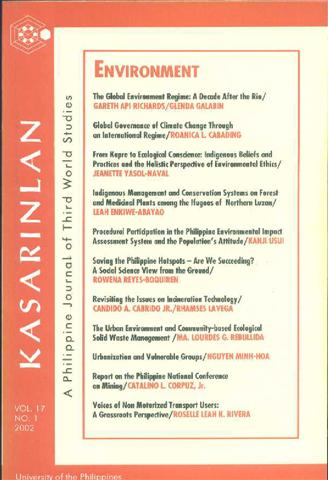Indigenous Management and Conservation Systems of Forest and Medicinal Plants among Ifugaos of Northern Luzon
Abstract
The utilization and conservation of natural resources of the indigenous peoples of Cordillera region in northern Philippines hinge on their ideological and cultural orientation. Abayao examines the Henanga sub-group's beliefs, forest conservationpractices and local intellectual property rights system, and how they influence the conservation of medicinal plant resources. Since time immemorial, Ayangan Ifugaos have been practicing [i]Pinuchu[/i], a term used to refer to the preservation of privately-owned and managed forest. Rights to these lands are established by one's capacity to improve the area for several generations. A good relationship with the - spiritual beings of nature is being maintained. To preserve and respect the areas
where they dwell, [i]paniyaw[/i] (taboos) are strictly observed. The local version of intellectual property rights protects the exclusivity of indigenous knowledge on medicinal plants within the circle of medicinal plants' specialists. The sacredness of these practices should remain intact, otherwise the effectiveness of the medicinal plants to cure will cease. However, one challenge facing the Ifugaos' medicinal plant preservation is the declining interest of the new generation to internalize these practices.
Published
2008-09-17
Section
Features
Keywords
Conservation Management; Indigenous Peoples
By submitting a manuscript, the authors agree that the exclusive rights to reproduce and distribute the article have been given to the Third World Studies Center.



